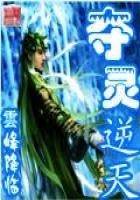Brott was talking to her in smothered and eager undertones. The Prince was waiting for an opportunity to intervene. Mr. Sabin looked into Brott's white strong face, and was thoughtful.
"It is a great power - the power of my ***," Lady Carey continued, with a faint, subtle smile. "A word from Lucille, and the history book of the future must be differently written."
"She will not speak that word," Mr. Sabin said. Lady Carey shrugged her shoulders. The subtlety of her smile faded away. Her whole face expressed a contemptuous and self-assured cynicism.
"You know her very well," she murmured. "Yet she and I are no strangers. She is one who loves to taste - no, to drink - deeply of all the experiences of life. Why should we blame her, you and I? Have we not the same desire?"
Mr. Sabin lit a cigarette.
"Once, perhaps," he remarked. "You must not forget that I am no longer a young man."
She leaned towards him.
"You will die young," she murmured. "You are not of the breed of men who grow old."
"Do you mean to turn my head?" he asked her, with a humorous smile.
"It would be easier," she answered, "than to touch your heart."
Then Lucille looked across at them - and Mr. Sabin suddenly remembered that Reginald Brott knew them both only as strangers.
"Muriel," she said, "you are behaving disgracefully."
"I am doing my best," Lady Carey answered, "to keep you in countenance."
The eyes of the two women met for a moment, and though the smiles lingered still upon their faces Lady Carey at any rate was not able to wholly conceal her hatred. Lucille shrugged her shoulders.
"I am doing my best," she said, "to convert Mr. Brott."
"To what?" Lady Carey asked.
"To a sane point of view concerning the holiness of the aristocracy,"
Lucille answered. "I am afraid though that I have made very little impression. In his heart I believe Mr. Brott would like to see us all working for our living, school-teachers and dressmakers, and that sort of thing, you know."
Mr. Brott protested.
"I am not even," he declared, "moderately advanced in my views as regards matters of your ***. To tell you the truth, I do not like women to work at all outside their homes."
Lady Carey laughed.
"My dear," she said to Lucille, "you and I may as well retire in despair. Can't you see the sort of woman Mr. Brott admires? She isn't like us a bit. She is probably a healthy, ruddy-cheeked young person who lives in the country, gets up to breakfast to pour out the coffee for some sort of a male relative, goes round the garden snipping off roses in big gloves and a huge basket, interviews the cook, orders the dinner, makes fancy waistcoats for her husband, and failing a sewing maid, does the mending for the family. You and I, Lucille, are not like that."
"Well, you have mentioned nothing which I couldn't do, if it seemed worth while," Lucille objected. "It sounds very primitive and delightful. I am sure we are all too luxurious and too lazy. I think we ought to turn over a new leaf."
"For you, dear Lucille," Lady Carey said with suave and deadly satire, "what improvement is possible? You have all that you could desire. It is much less fortunate persons, such as myself, to whom Utopia must seem such a delightful place."
A frock-coated and altogether immaculate young man approached their table and accosted Mr. Sabin.
"I beg your pardon, sir," he said, "but the manager would be much obliged if you would spare him a moment or two in his private room as soon as possible."
Mr. Sabin nodded.
"In a few minutes," he answered.
The little party broke up almost immediately. Coffee was ordered in the palm court, where the band was playing. Mr. Sabin and the Prince fell a little behind the others on the way out of the room.
"You heard my summons?" Mr. Sabin asked.
"Yes!"
"I am going to be cross-examined as regards Duson. I am no longer a member of the Order. What is to prevent my setting them upon the right track?"
"The fact," the Prince said coolly, "that you are hoping one day to recover Lucille."
"I doubt," Mr. Sabin said, "whether you are strong enough to keep her from me."
The Prince smiled. All his white teeth were showing.
"Come," he said, "you know better than - much better than that.
Lucille must wait her release. You know that."
"I will buy it," Mr. Sabin said, "with a lie to the manager here, or I will tell the truth and still take her from you."
The Prince stood upon the topmost step of the balcony. Below was the palm court, with many little groups of people dotted about.
"My dear friend," he said, "Duson died absolutely of his own free will. You know that quite well. We should have preferred that the matter had been otherwise arranged. But as it is we are safe, absolutely safe."
"Duson's letter!" Mr. Sabin remarked.
"You will not show it," the Prince answered. "You cannot. You have kept it too long. And, after all, you cannot escape from the main fact. Duson committed suicide."
"He was incited to murder. His letter proves it."
The Prince shrugged his shoulders.
"By whom? Ah, how your story would excite ridicule. I seem to hear the laughter now. No, my dear Souspennier, you would bargain for me with Lucille. Look below. Are we likely to part with her just yet?"
In a corner, behind a gigantic palm, Lucille and Brott were talking together. Lady Carey had drawn Opperman a little distance away.
Brott was talking eagerly, his cheeks flushed, his manner earnest.
Mr. Sabin turned upon his heel and walked away.















